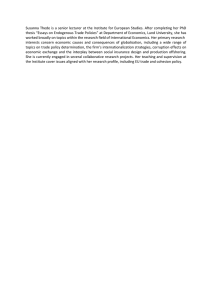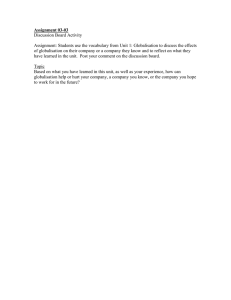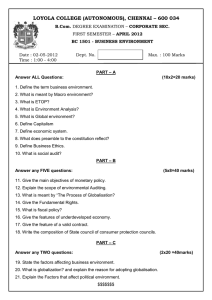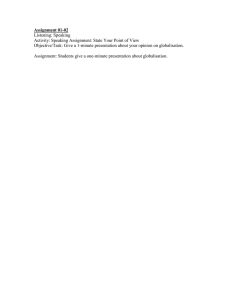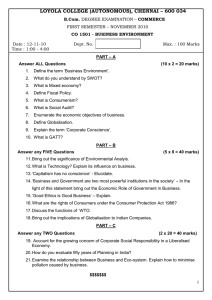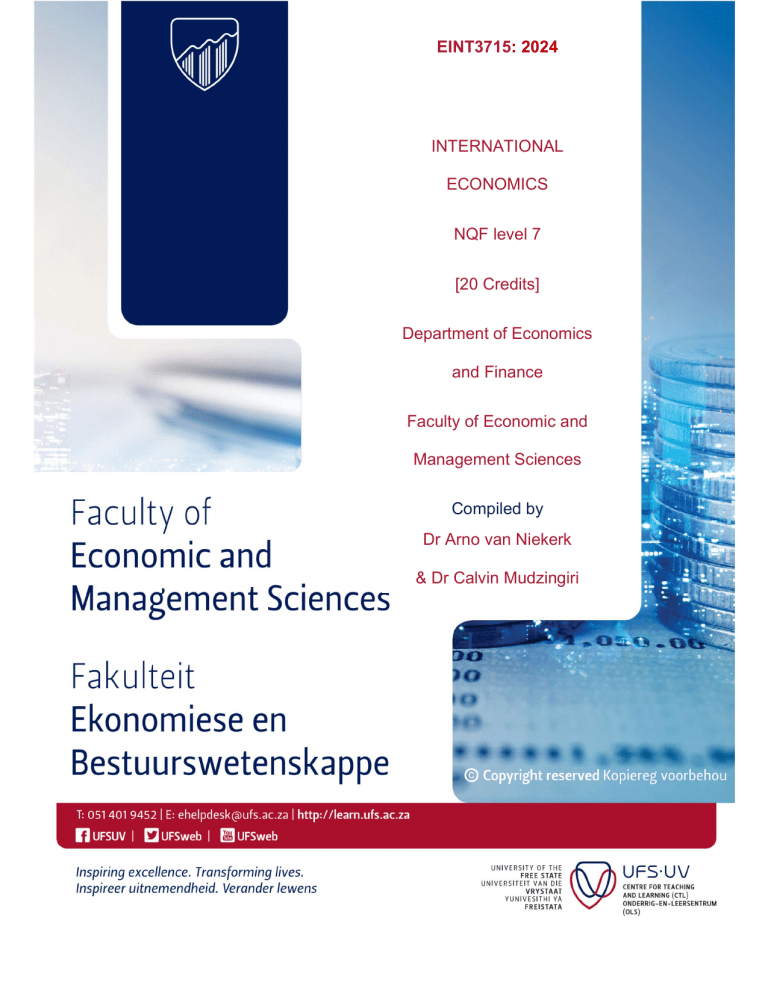
EINT3715: 2024 INTERNATIONAL ECONOMICS NQF level 7 [20 Credits] Department of Economics and Finance Faculty of Economic and Management Sciences Compiled by Dr Arno van Niekerk & Dr Calvin Mudzingiri TABLE OF CONTENTS 1. Welcoming.................................................................................................................... 5 2. Contact Sessions ......................................................................................................... 7 3. Study Material .............................................................................................................. 7 4. Assessment .................................................................................................................. 8 5. Amendment of module information and resources ................................................... 8 6. Module Outcomes ........................................................................................................ 8 7. Learning Units (Module Journey) ............................................................................... 9 Table 1: Icon Library Icon Description Welcoming message and lecturer information Action words, terms and concepts that need to be understood Prerequisites of the module Face-to-face contact sessions Activities to be completed individually (preparation). You may still ask for feedback from your tutor or lecturer when you encounter aspects that you have difficulty with Unit-specific study material for the module Resources to be consulted (such as the textbook, additional reading material, etc.) 3|Page The roadmap that contextualises (puts into perspective) the different pieces of information in the module An indication of an important reminder/caution from your lecturer Assessment questions and opportunities Assessment criteria for the module A learning unit Learning unit overview for a specific unit 4|Page 1. WELCOMING Dear student, Welcome to EINT3715, International Economics! We are looking forward to be teaching to you this module. Here is all the information that you will need to contact me, as well as other relevant staff in the Department of Economics and Finance. BLOEMFONTEIN CAMPUS LECTURER: Lecturer: Dr Arno van Niekerk Office number: FFG 335 Email address: niekerka@ufs.ac.za Phone number: 051 401 3271 Consulting hours: Wednesdays, 12:00 – 13:00 PLEASE ADHERE TO THIS SLOT OR SPEAK TO ME AFTER CLASS. Note: I will only see students a day before the test that made an appointment in advance. No last minute, unplanned discussions. QWAQWA CAMPUS LECTURER: Lecturer: Dr Calvin Mudzingiri Office number: B16 EMS Building Email address: mudzingiric@ufs.ac.za Phone number: 058 718 5069 Consulting hours: Wednesday, 15:00 – 16:00 Monday, 15:00 – 16:00 PLEASE ADHERE TO THESE SLOTS AT ALL TIMES. Note: I will only see students a day before the test that made an appointment in advance. No last minute, unplanned discussions. BLOEMFONTEIN CAMPUS SECRETARY Name: Me Kedi Willie Office number: FGG 333 Email address: WillieKN@ufs.ac.za Phone number: 051 401 7744 Consultation hours: Mondays - Fridays, 9h00 – 16h00 BLOEMFONTEIN CAMPUS MARKS COORDINATOR Name: Mrs H. Van Tonder Office number: FGG 346 Email address: vtonderh@ufs.ac.za Phone number: 051 401 2166 Consultation hours: Tuesday, 10:00-12:00 Thursday, 10:00-12:00 QWAQWA CAMPUS SECRETARY Name: Mr. Thabiso Moteka Office number: EMS Building B17 Email address: motekatp@ufs.ac.za Phone number: 058718 5115 Consultation hours: Mondays - Fridays, 9h00 – 12h30 QWAQWA CAMPUS MARKS COORDINATOR Name: Dr Calvin Mudzingiri Office number: EMS Building B16 Email address: mudzingiric@ufs.ac.za Phone number: 058 718 5069 Consultation hours: Mondays - Fridays, 09h00 – 12h30 6|Page 2. CONTACT SESSIONS Please consult the UFS official class timetable (available at: http://www.ufs.ac.za/adhocpages/quick-links/official-timetables) for the dates, venues and times scheduled for contact sessions. ENGLISH CLASSES for Bloemfontein Campus DAY PERIOD TIME VENUE Monday 6 12:10-13:00 STB 4 Wednesday 5 11:10-12:00 HMS Thursday 2 8:10-9:00 (as needed) MAB Aud ENGLISH CLASSES for QwaQwa Campus DAY PERIOD TIME VENUE Wednesday 4&5 11:10- 13:00 B4 Monday 7&8 08:00-10:00 NS27 3. STUDY M ATERIAL PRESCRIBED TEXT BOOK(S) Appleyard, D. and A. Field (2016) International Economics. 9th edition. McGraw-Hill. Available as an eBook: https://www.vitalsource.com/za/products/international-economicsappleyard-dennis-v9781526814975?term=Economics%2C+Appleyard ADDITIONAL: Salvatore, D. (2011). International Economics, 10th edition. John Wiley. Mohr, P. (2016). Economic Indicators – fifth edition. Van Schaik Publishers South African Reserve Bank, http://www.reservebank.co.za/ Department of Trade and Industry, http://www.dti.gov.za 7|Page Additional study material will be provided on Blackboard. 4. ASSESSMENT The Faculty's test timetable is available on the web at the following address: http://www.ufs.ac.za/ekon PLEASE NOTE: It is possible that scheduled test dates can change. It is the student’s responsibility to be up to date with the latest test dates. Your semester mark will be calculated as follows: International economics (you can only write two out of the following three tests): Test 1: 13 March 2024 (during class time) 35 marks Test 2: 24 April 2024 (during class time) 35 marks Test 3: 22 May 2024 (during class time) 35 marks CSL-project: 25 March 2024 15 marks Assignment 1: 6 May 2024 15 marks Semester mark 100 marks (Weight: 60%) Examination: (Weight: 40%) To gain entrance to the examinations, the student’s record must be complete, i.e. at least two tests (any two of the three tests) must have been written and assignments submitted. If a student writes the first two tests, the third test may NOT be written to improve marks. No letter from the doctor is needed for writing Test 3 if one of the previous two tests were missed. 5. AMENDMENT OF MODULE INFORMATION AND RESOURCES The work schedule and syllabus (study material) can be amended, verbally or in writing, by the lecturer or the Department of Economics and Finance at any point in time. It is the responsibility of the student who is registered for the module to stay up to date with the schedule and syllabus. Such announcements and changes can be made during face-to-face contact sessions (classes) or via communication on Blackboard. We recommend that students go on to Blackboard daily to stay up to date regarding any changes in EINT3715. Any work that is covered in the contact sessions can be used for assessment purposes. 6. M ODULE O UTCOMES The AIM of this course is to introduce students scientifically into the inclusive world of international economics, so that at the conclusion of the course students will be able to: define, describe, comprehend and apply the concepts and terminology used in international economics; 8|Page explain and clarify international trade between countries; describe international payments between countries; comprehend and indicate where South Africa stands in the international economy (trade, payments and relations); and interpret the role of globalisation in global economic cooperation and integration. OVERALL OUTCOME: At the end of this course/module, the student must be able to: understand and apply the principles of international economics (including regionalism and globalisation). LEARNING SPECIFIC OUTCOMES: 1. Learners must be able to master and apply the principles of International trade. 2. Learners must be able to analyse and apply the theory and principles of the international trade policy. 3. Learners must be able to identify exchange rates and also to understand and apply its integration with other economic variables. 4. Learners must be able to describe and analyse the balance of payments and show its implications for policy purposes. 5. Learners must have a thorough understanding of the bigger picture of globalisation in order to properly interpret and explain the realities of the international economy. 7. LEARNING UNITS (M ODULE JOURNEY) 1. ORIENTATION 2. WHY NATIONS TRADE: THE CLASSICAL THEORY Globalisation: Article 1 3. WHY NATIONS TRADE: THE MODERN THEORY Globalisation: Article 2 4. THE BASIS OF TRADE: LABOUR PRODUCTIVITY AND FACTOR PROPORTIONS 5. TRADE THEORY: NEW APPROACHES AND EXTENSIONS Globalisation: Article 3 LEARNING SPECIFIC OUTCOME 1 9|Page 6. TRADE UNDER CHANGING CONDITIONS Globalisation: Article 4 7. GOVERNMENT INTERVENTION LEARNING SPECIFIC OUTCOME 2 8. ECONOMIC INTEGRATION AND CO-OPERATION Globalisation: Article 5 9. INTERNATIONAL TRADE, TRADE POLICY AND ECONOMIC DEVLEOPMENT (AND SA TRADE POLICY ISSUES) 10. EXCHANGE RATES DETERMINATION Globalisation: Final discussion & video LEARNING SPECIFIC OUTCOME 3, 4 & 5 ASSIGNMENT/ INDEPENDENT RESEARCH (15%) As part of completion of this semester, each student has to hand in an assignment (the result of his/her own independent research) – no later than Monday, 6 May 2024 at any time. This assignment should comply with the following: A clear aim and research question should be stated in the Introduction. The length of the assignment should be about 2000 words. A clear Conclusion at the end – in which the stated research question is answered. References and cross-referencing should be done scientifically by using the Harvard method, for example. Your assignment should first be submitted on Turn-It-In on Blackboard to check for plagiarism. The final submission can be done electronically on Blackboard. Your assignment should address one of the following issues: South Africa and the effect of trade agreements on our economy. Capital flows to and from South Africa since 2010. The contribution of South African imports and exports since 2010. South Africa’s main trading partners since 2010. Globalisation and economic integration. The impact of technology on the global economy. Any topic of your own (regarding international economics) that has been approved by the lecturer. 10 | P a g e 25 March 2024 11 | P a g e Group Assignment structure 1. Define the terms chosen and background information of the terms with reference to South Africa. 2. Draft a questionnaire with international economics terms, your group questions should be the same. 3. You may include the following demographic information in the Questionnaire: i) Gender ii) Level of education iii) Occupation iv) Age 4. Write the objective of your research, that is, why you are carrying out the research? 5. Ask interviewee questions on international economics from you drafted questionnaire, then explain the concept in detail to them if they cannot answer the question properly. 6. Interviewee should air his opinion about the interview to be included at the end of their responses. 7. After collecting the data analyze the percentages of people who are knowledgeable and not by gender, level of education, occupation and age. 8. From your findings what makes one knowledgeable? 9. What did you learn from your research? 10. Are there policy interventions that can be implemented in the society? 11. Create a table like the one below to help you analyze the data you collected. Question Qn 1 Qn 2 Gender Knowledgeable Not knowledgeable Male Female Total male female male female Eg 25 25(50%) 50 15 10(40%) (50%) (100%) (60%) Know Do not know 30 (60%) 20 (40%) Up to Q10 Total LASTLY: To be SUCCESSFUL in this course, insight, organised study, problem-solving, graphical illustrations and class attendance are all essential prerequisites. Problems which might arise in connection with test or submission of assignments must be discussed with the lecturer beforehand. Queries with regard to the marking of tests must be referred to the lecturer within a week after the test marks have been made available. Medical certificates must be personally submitted to the lecturer so that the dates for an oral or written test can be arranged. Medical certificates may not be submitted more than a day after their expiry date. Good luck with the course and ENJOY IT! He who teaches people facts, lives for today and dies when facts have changed. But he who teaches people to THINK, lives forever as long as thought does reign. 12 | P a g e COVER PAGES FOR ASSESSMENTS All students registered for modules in the Faculty must use the cover page(s) provided on the following pages as a front page when handing in any assessments (excluding tests and examinations). There are two cover pages; one for individual assessments and one for group assessments. The last cover page that consists only of group members’ details will only be applicable if there are more than 8 members in a group. These cover pages will also be available electronically on I-LEARN (Blackboard). FACULTY OF ECONOMIC AND MANAGEMENT SCIENCES COVER PAGE FOR INDIVIDUAL ASSESSMENTS MODULE CODE: SURNAME: INITIALS: STUDENT NUMBER: DUE DATE: DECLARATION BY STUDENT I have read the University’s Policy on the Prevention of Plagiarism and Dealing with Academic Writing Misconduct: I understand that I must: 1. abide by all the directives of this Policy, the Assessment Policy, course guides, specific and general regulations and assessment requirements; 2. seek assistance if I am unsure about appropriate citation and referencing techniques; 3. accept responsibility for having full knowledge of the Policy; 4. submit only my own work for any form of assessment, except where: the work of others is appropriately acknowledged; and the assessor/moderator has required, or given prior permission for, group or collaborative work to be submitted; 5. refrain from intentionally or negligently deceiving the reader by preventing my own work from being copied by another student, who may or may not have an intentional or negligent aim to deceive the reader; 6. be aware that according to the Policy, measures for all Level Four violations and repeated Levels One, Two and Three violations are reported and investigated in accordance with the UFS Statute on Student Discipline (see Chapter XIII, pp 50 – 58); and 7. include with my assignment an electronic report of the software programme if required/where applicable. 13 | P a g e D SIGNATURE STUDENT NR D M M Y Y DATE MARK: PERCENTAGE: % COMMENTS FROM ASSESSOR: 14 | P a g e Y Y FACULTY OF ECONOMIC AND MANAGEMENT SCIENCES COVER PAGE FOR GROUP ASSESSMENTS MODULE CODE: GROUP NAME: DUE DATE: DECLARATION BY GROUP We have read the University’s Policy on the Prevention of Plagiarism and Dealing with Academic Writing Misconduct: We understand that we must: 1. abide by all the directives of this Policy, the Assessment Policy, course guides, specific and general regulations and assessment requirements; 2. seek assistance if we are unsure about appropriate citation and referencing techniques; 3. accept responsibility for having full knowledge of the Policy; 4. submit only our own work for any form of assessment, except where: the work of others is appropriately acknowledged; and the assessor/moderator has required, or given prior permission for, group or collaborative work to be submitted; 5. refrain from intentionally or negligently deceiving the reader by preventing our own work from being copied by another student, who may or may not have an intentional or negligent aim to deceive the reader; 6. be aware that according to the Policy, measures for all Level Four violations and repeated Levels One, Two and Three violations are reported and investigated in accordance with the UFS Statute on Student Discipline (see Chapter XIII, pp 50 – 58); and 7. include with our assignment an electronic report of the software programme if required/where applicable. SURNAME INITIALS STUDENT NUMBER SIGNATURE 1 2 3 4 5 6 7 8 15 | P a g e 8.MODULE JOURNEY MAP TEMPLATE A module journey map should be followed of all the learning units (and themes, if applicable) that will be covered in the module. The purpose of the module journey map is to give students a visual overview of what to expect during the course of the module. Module journey map template. UNIT 10: Exchange Rates Determination. Globalisation Video and final discussion 10 UNIT 9: International Trade, Trade Policy and Economic Development (and SA trade issues. Globalisation. Art. 5 UNIT 4: Labour productivity and factor Proportions UNIT 2: Why Nations Trade: Classical theory Globalisation Article1 2 1 UNIT 7: Government intervention; Glob Art.4 9 8 7 UNIT 8: Economic integration and Co-operation. Globalisation Art. 5 UNIT 6: Trade under changing Conditions; Glob. 3 Art 3 5 4 UNIT 5: New approaches and extensions, globalisation Article 2 UNIT 3: Why Nations Trade: Modern Theory, Globalisation 2nd half atricle1 6 UNIT 1: Orientation 16 | P a g e
